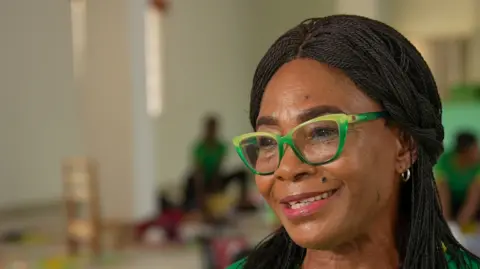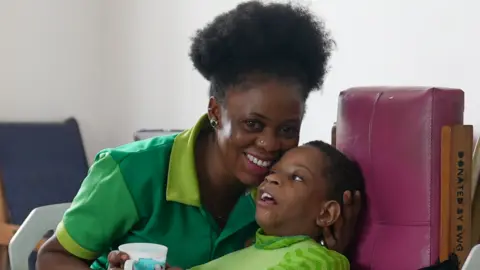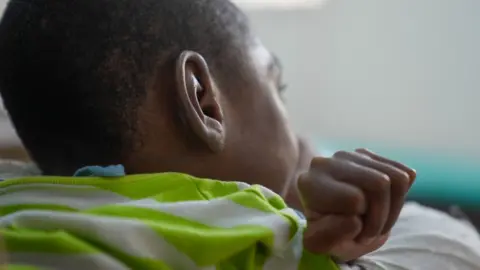 Joyce Liu / BBC
Joyce Liu / BBCAlthough Babatunde Fashola, affectionately known as Baba, is 22 years old, he is less than 70cm (2ft 4in) tall.
He suffers from cerebral palsy and requires lifelong care. He cannot speak or walk and is fed through a tube attached to his stomach.
As a baby he was abandoned by his parents, but 10 years ago he found a home at the cerebral palsy center in the Nigerian city of Lagos.
“Baba weighs around 12 kg [26lb]. He is doing well,” the establishment’s founder, Nonye Nweke, told me during my visit.
Ms Nweke and her team are working around the clock to support him and other young people living with permanent brain damage.
Although there is a lack of official data, cerebral palsy is considered one of the most common neurological disorders in Nigeria. In 2017, a professor of medicine at the University of Lagos said 700,000 people suffered from the disease.
For many people with cerebral palsy in the country, their condition was caused by a common phenomenon among newborns: neonatal jaundice.
This is due to a buildup of bilirubin, a yellow substance, in the blood, meaning babies’ skin has a yellow tint.
Professor Chinyere Ezeaka, a pediatrician at the Lagos University Teaching Hospital, told the BBC that more than 60% of all babies suffer from jaundice.
Most babies recover within a few days. More severe cases require additional medical intervention – and even then the condition is easily treatable.
Children are primarily exposed to ultraviolet light to dissolve excess bilirubin in their red blood cells. The treatment lasts a few days depending on the severity.
However, in Nigeria, this treatment is often not immediately available, which is why the country is among the five countries in the world with the most neurological disorders caused by untreated jaundice, according to data from the World Health Organization (WHO).
Any treatment for neonatal jaundice “must take place within the first 10 days of life, otherwise [the condition] could cause permanent brain damage and severe cerebral palsy,” says Professor Ezeaka.
Worse still, the West African country lacks facilities to treat people with neurological disorders. There are only three cerebral palsy centers, all private, in Nigeria, which has more than 200 million inhabitants.
Ms Nweke – a single mother – established the Cerebral Palsy Center after struggling to find support for her own daughter, Zimuzo.
“When I took her to daycare [centre]They asked me to take it back because other mothers wanted to take their children away. As a mum, I have to say it was quite devastating,” Ms Nweke told the BBC.
Zimuzo is now 17 and Ms Nweke’s Cerebral Palsy Center offers full-time support to others going through similar experiences.
On the day I visit, colorful play mats and toys are neatly laid out on the floor. Mickey Mouse and his friends chat on a big screen TV in the living room.
Twelve young people, some as young as five years old, watch television, ignoring their bright surroundings for a moment. They are all still and don’t speak.
 Joyce Liu / BBC
Joyce Liu / BBCAt lunchtime, caregivers help the young people eat. Some take in liquid food through tubes attached to their stomachs.
Carefully and slowly, caregivers support their heads with pillows and push the contents of their syringes into the tubes.
The young are fed every two hours and require regular muscle massages to avoid aches.
But they are the lucky 12 to receive free care from the Cerebral Palsy Center, funded exclusively by donors.
The establishment has a long waiting list – Ms Nweke has received more than 100 applications.
But welcoming more young people would require additional financial support. The cost of caring for one person at the center is at least $1,000 (£790) a month – a huge sum in a country where the national minimum wage is around $540 a year.
“As a mum, I have to say it’s quite overwhelming. You have moments of depression, it gives you grief and it’s quite expensive – in fact it’s the most expensive congenital condition to deal with,” explains Ms. Nweke.
“And then of course it alienates you from people because you don’t discuss the same things. They talk about their babies, walk, enjoy those baby moments. You don’t do that. You’re sad,” adds -She.
Ms. Nweke explains that she adopted Zimuzo from an orphanage.
A few months after bringing home her new daughter, Ms Nweke realized that Zimuzo was not developing in the same way as the children around her. She was examined at the hospital and diagnosed with cerebral palsy.
Ms Nweke was told she could take Zimuzo, then a few months old, back to the orphanage and adopt another baby instead, but she refused.
“I decided to keep her and started researching the cause of this disorder, the treatment and the type of care my child would need – she is my life.
“The doctors also told me that she would not live more than two years. Well, here we are, 17 years later,” says Ms. Nweke, smiling.
A lack of awareness and adequate medical support hampers the diagnosis and treatment of neonatal jaundice in Nigeria.
Ms Nweke also says the widespread local belief that children with congenital disorders are spiritually damaged or bewitched leads to stigmatization.
Some children with neurological disorders – mainly in rural Nigeria – are labeled witches. In some cases, they are abandoned in houses of prayer or kicked out of their families.
 Joyce Liu / BBC
Joyce Liu / BBCMs Nweke is not alone in her mission to dispel myths and improve care.
The Oscar Project, a charity aimed at improving the diagnosis and treatment of neonatal jaundice, recently began operations in Lagos.
The project is named after Oscar Anderson, a British-Vietnamese disability advocate whose untreated jaundice caused his cerebral palsy.
“We are equipping health facilities at primary, secondary and tertiary levels with the necessary equipment to treat jaundice, mainly light boxes, but also detection and screening equipment,” Toyin Saraki, who oversaw the launch.
Project Oscar, supported by consumer health company Reckitt, is training 300 health workers in Lagos. The hope in the first year is to reach 10,000 mothers, screen 9,000 children and introduce new protocols to try to prevent babies with jaundice from developing cerebral palsy.
In a country where the public health system is overburdened, the government has little to say about the disease, although it has praised the aims of Project Oscar.
Treatment for neonatal jaundice is significantly cheaper than the cost of lifelong care, doctors say.
First launched in Vietnam in 2019, Project Oscar has helped around 150,000 children in the Asian country.
Mr. Anderson, 22, says he wants to prevent other children from going through what he did.
“Disabled people should not be underestimated,” he told the BBC.
It works to ensure screening for neonatal jaundice in every newborn and, with the support and courage of mothers, midwives and healthcare professionals, to ensure better understanding and faster treatment.
However, achieving this is a hugely ambitious goal in Africa’s most populous country, where thousands of babies are born with neonatal jaundice each year.
Either way, Mr. Anderson is determined to defy the odds.
“The work won’t stop until every baby is protected against neonatal jaundice,” he says.
More Nigeria stories from the BBC:
 Getty Images/BBC
Getty Images/BBC






